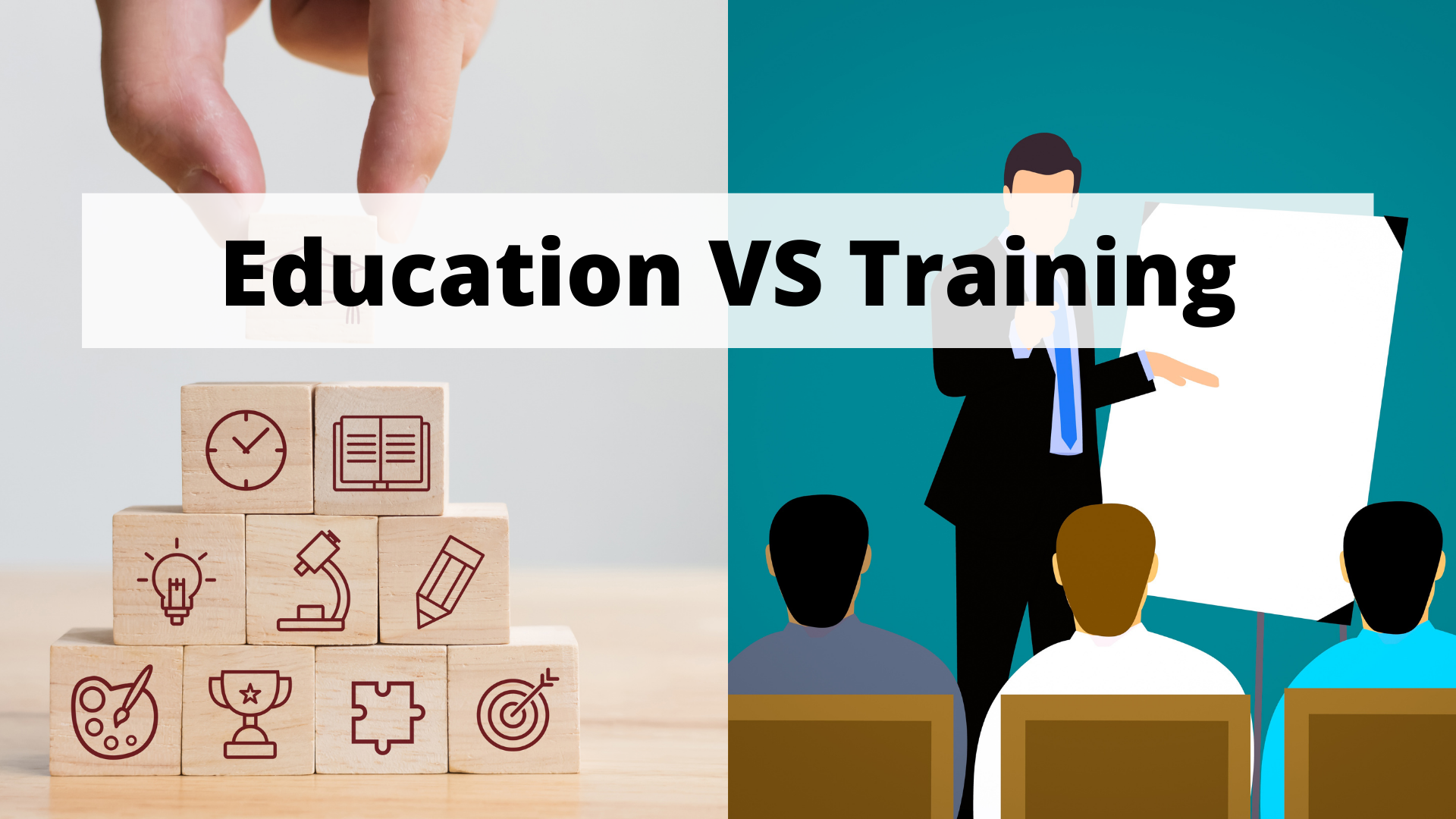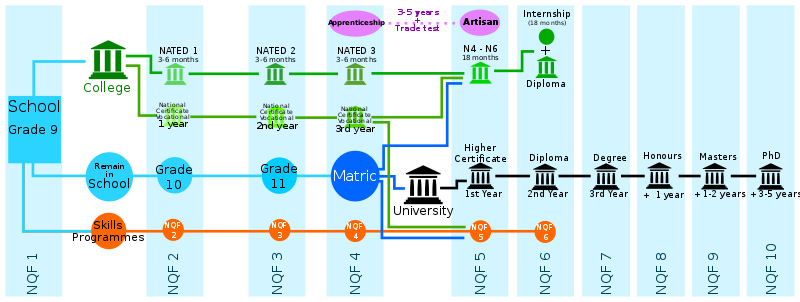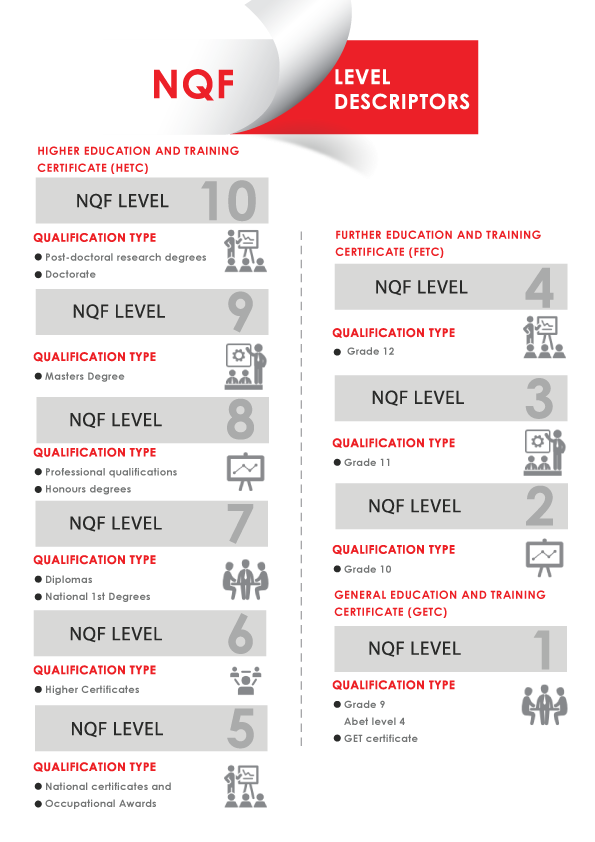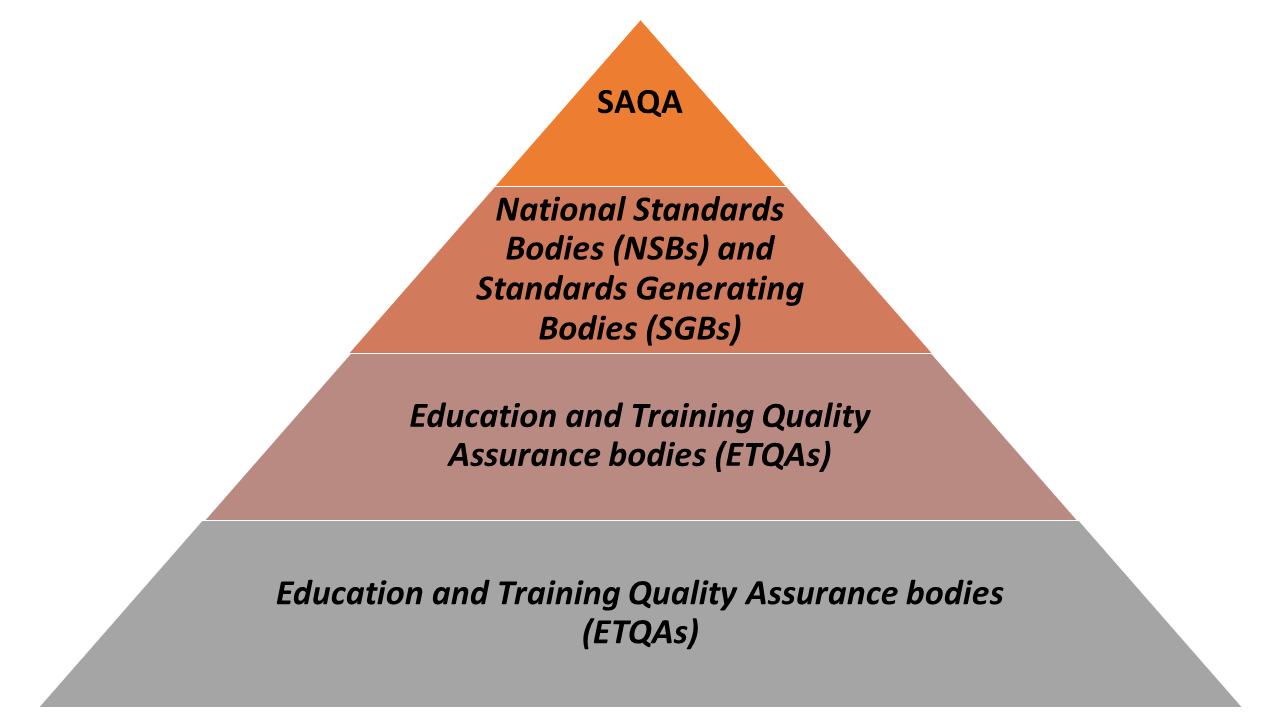The South African Qualifications Authority Act (1995)
Click here to view a video that explains SAQA.
The South African Qualifications Authority Act No 58 of 1995 (here forth referred to as the SAQA Act) was enacted on October 4, 1995. With this act, a juristic person called the South African Qualifications Authority was established and provision was made for a National Qualifications Framework (NQF). Provision was also made for the design of competence-based national qualifications and national standards, and for the development of outcomes-based education and training.
The SAQA Act describes the objectives of the NQF and provides details on how SAQA should function - its structure, finances, etc.
The purpose of the SAQA Act is to provide for the development and implementation of a National Qualifications Framework (NQF), and for this purpose to establish the South African Qualifications Authority and to provide for matters connected therewith.
SAQA's mission is to ensure the development and implementation of a National Qualifications Framework which contributes to the full development of each learner and to the social and economic development of the nation at large.

Traditionally "education" and "training" were treated as separated entities with separate and disparate purposes. Education was seen as a means of developing children to become adults and training as the means of preparing adults for the performance of tasks relating to specific types of work. Further fragmentation was caused by racial, ethnic and gender discrimination, which caused unequal standards, lack of access and unequal access at all levels of the system.
The Origins of the NQF
A basic understanding of the origins of the NQF will help you make easy sense of the functions and structures of the framework.
When the new Government of National Unity came into being in 1994, its intention to transform education and training faced mammoth challenges. The legacy of racial segregation, with all its built-in privileges, inequalities and injustices, had to be undone. But even the privileged white sector lacked true freedom, dominated as it was by a tendency to authoritarian approaches and blinkered thinking. As a result, the heritage of the past was disfigured by a class system in which anything academic and theoretical was regarded as superior (even when it was low grade and not very useful). On the other hand, people with the most useful practical wisdom got very little recognition, were regarded as inferior, struggled to move upwards into higher levels of work, and often could not cross sideways into academic study. In this situation, many of the skills most needed by the country were neglected or downgraded.
In the new order, democratically empowered taxpayers and citizens were expected to insist on a more accountable, meaningful provision of education - the biggest item in the national budget. Progressive educators and trainers, and protesting learners as well, wanted a revolution in the curriculum. Leaders in labour and business wanted South Africa to be a learning nation that was inventive, productive and competitive. The contemporary world increasingly demands that economically active people become flexibly and rapidly responsive to new knowledge. Instead of a world where people finished school and 'never learnt again' what was needed was 'lifelong learning'.
In order to foster such transformation, South Africa took up and adapted from a number of other countries the emerging international practice of making a coherent framework for national qualifications. Over several years of tough negotiation and concept-development by labour and business, state and providers, this idea was forged into the South African NQF.
The Intentions of the NQF
This brief history should already have provided a clear sense of the intentions of the NQF. The NQF is intended to be a significant force in the transformation of education and training in South Africa. At its heart is the quest for equity and quality - two values that cannot in reality be separated. It must draw together different types and areas of learning to give them new status and recognition. It is meant to be nurturing and developmental - to foster improvement in the learning of the nation. To put it in a nutshell, the role of the NQF is to make sure that South Africa's investments in learning of all kinds are worthwhile for all the people of the country.
The principles of the NQF express the intention to promote equity, relevance, mobility, transportability and transparency. Qualifications that merely promote narrow technical skills do not have satisfactory quality.
The critical outcomes of the NQF are concerned that learning should lead to real competence in problem-solving, working with others, using resources, and understanding environmental and civic consequences and responsibilities of decisions.
Definition
The NQF is a structure that organises and classifies qualifications and competencies in SA. It consists of registered unit standards and qualifications at eight levels of learning.
What is the Purpose of the NQF?

The NQF is a means for transforming training in South Africa. It has been designed to:
- Create an integrated national framework for learning achievements. Combining education and training into a single framework and to bring together separate education and training systems into a single, national system.
- Facilitate access to, and mobility and progression within education, training and career paths. Make it easier for learners to enter the education and training system and to move and progress within it.
- Enhance the quality of education and training in South Africa.
- Accelerate redress of past unfair discrimination in education, training and employment opportunities.
- Enable learners to develop to their full potential and thereby support the social and economic development of the country as a whole.
- Recognise learning achievements through informal and formal means.
- Help people gain nationally recognised and portable (transferable) skills.
- Help identify capabilities needed to work.
- Help identify current skills gaps in order to develop training programmes.
- Provide an overview of capabilities needed in a profession.
- Provide employees with access to a career path.
- Improve recognition of prior learning.
The Underlying Principles of the NQF
Click here to view a video that explains South Africa’s NQF.
A set of principles has been developed in terms of the National Training Strategy Initiative that will help establish the improved education and training system.
These principles are as follows:
|
Principle |
Definition: Education and Training should... |
|
Integration |
Form part of a system of human resources development that provides for the establishment of a unifying approach to education and training. |
|
Relevance |
Be and remain responsive and appropriate to national developmental needs. |
|
Credibility |
Have national and international value and acceptance. |
|
Coherence |
Work within a consistent framework of principles and certification. |
|
Flexibility |
Allow for multiple pathways to the same learning ends. |
|
Standards |
Be expressed in terms of a nationally agreed framework and should have internationally acceptable outcomes. |
|
Legitimacy |
Provide for the participation of all national stakeholders in the planning and co-ordination of standards and qualifications. |
|
Access |
Provide ease of entry into appropriate levels of education and training for all prospective learners in a manner which facilitates progression. |
|
Articulation |
Provide for learners, on compliance with accredited prerequisites, to move between components of the delivery system. |
|
Progression |
Ensure that the framework of qualifications permits individuals to move through the levels of national qualifications via different appropriate combinations of the components of the delivery system. |
|
Portability |
Enable learners to transfer their credits or qualifications from one learning institution and/or employer to another. |
|
Recognition of Prior Learning |
Through assessment, give credit to learning that has already been acquired in a different way, e.g. through life experience. |
|
Guidance of learners |
Provide for the counselling of learners by specially trained individuals who meet nationally recognised standards for educators and trainers. |
Structure of the NQF
SAQA has adopted an ten-level framework, with levels 1 to 10 respectively being regarded as open-ended.

The eight levels of the NQF are grouped into the following three bands of learning:
Level 1: General Education and Training band
Levels 2 to 4: Further Education and Training band
Levels 5 to 10: Higher Education and Training band
Descriptors of levels (level 1 — level 10) are statements about intellectual demand, complexity of learning and learners' autonomy. A level descriptor is therefore a description of the competence required on each of the defined learning levels of the NQF.
The degree of detail and generality required in level descriptors depends on their purpose and use.
Who Benefits from the National Qualifications Framework?
Learners: Benefit from quality education provision and qualifications that enjoy national recognition and where appropriate, international comparability.
Workers: Benefit from clear learning paths in the qualification structure, to facilitate and support life-long learning and career advancement.
Employers: Benefit from a work force, competent in the skills and attitudes required in the competitive global economy of which South Africa is a part.
Society: Benefits from a proud, learning nation with the intellectual ability to adapt swiftly to change especially technological change.
Certain Structures And Bodies Are Required To Standardise The Validity Claims Of Learning

The South African Qualifications Authority (SAQA) is a statutory body, established by an Act of Parliament, and reports to the Ministers of Education and Labour. SAQA oversees the implementation of the NQF and ultimately registers all officially recognised qualifications produced in the country.
National Standards Bodies (NSBs) and Standards Generating Bodies (SGBs) generate and approve descriptions of knowledge, values and skills that are worthy of recognition. To do this, SGBs create 'Unit Standards' and design qualifications made up of Unit Standards. (There are 12 NSBs for different fields of learning.)
Education and Training Quality Assurance bodies (ETQAs) ensure that the knowledge, values and skills described in the Unit Standards and registered qualifications have been properly assessed, and issue certificates. Each Sector Education and Training Authority (SETA) has an ETQA for its specialised fields. Umalusi quality assures all General and Further Education and Training qualifications, and the Higher Education Quality Council (HEQC) all learning from Level 5 upwards.
Accredited providers have the professional capacity to assess learning at the site of learning. The ETQAs have the power to accredit. Accreditation helps to share responsibility for the development and assurance of quality throughout the systems of provision.
Through these structures and powers, the NQF has considerable influence over the way learning is promoted in the country. This influence is extended by the National Skills Development Strategy (NSDS), which has secured unprecedented funding to finance learning in the workplace, especially through Learner ships (which are similar, but also different to, the old apprenticeships). The NSDS, operating especially through the Department of Labour and the SETAs, in principle only supports learning that leads to credits or qualifications on the NQF. The NSDS provides fuel and drivers for achieving the intentions of the NQF.